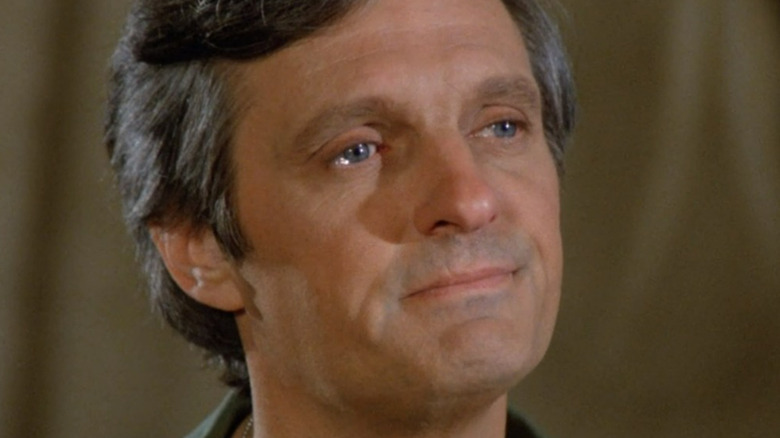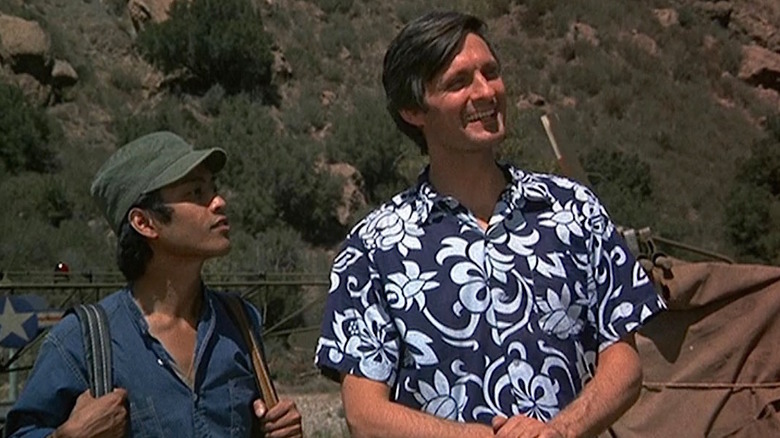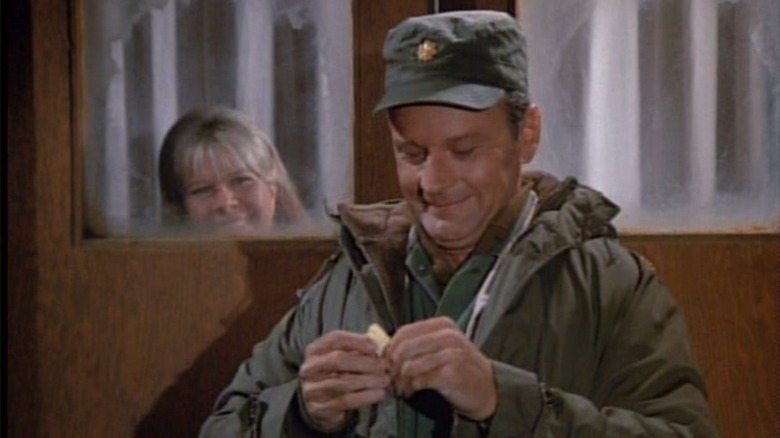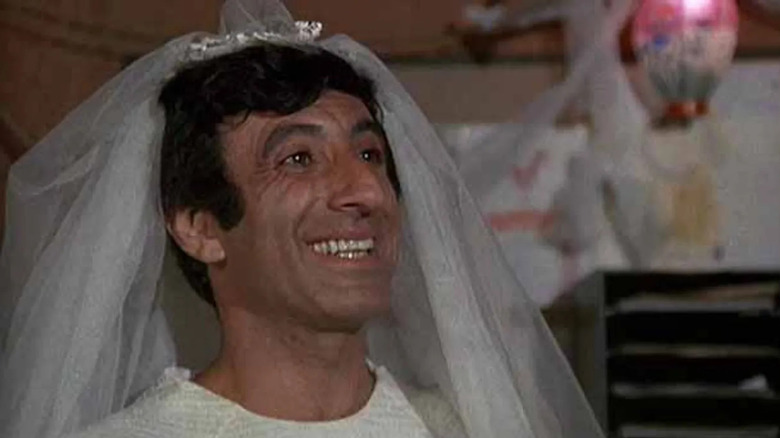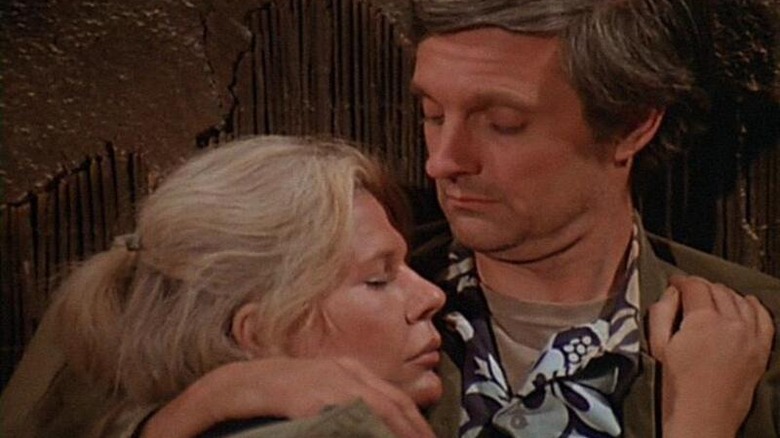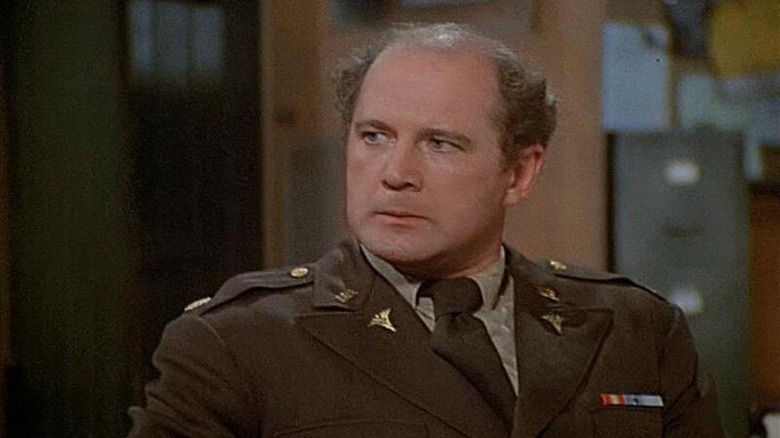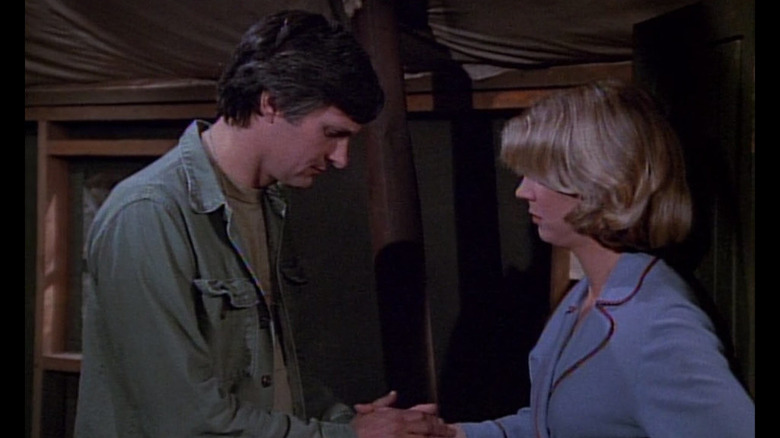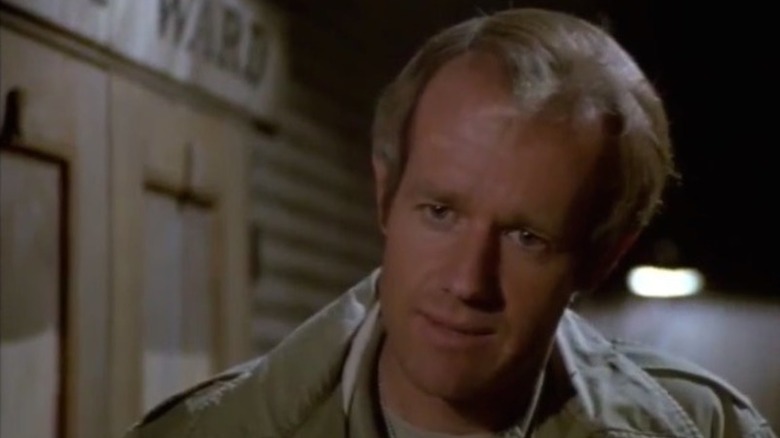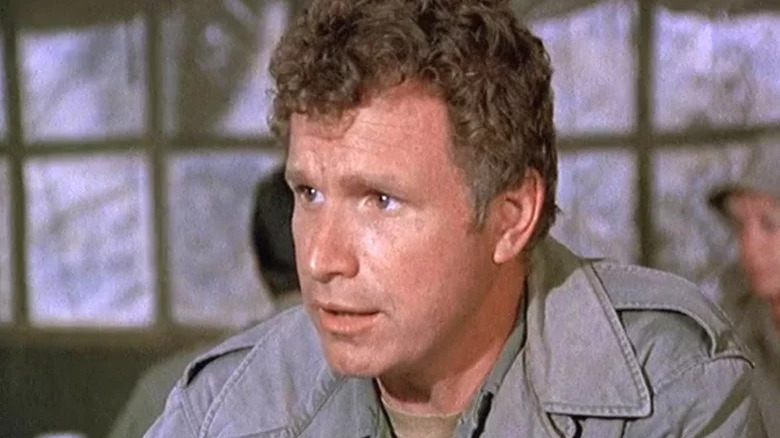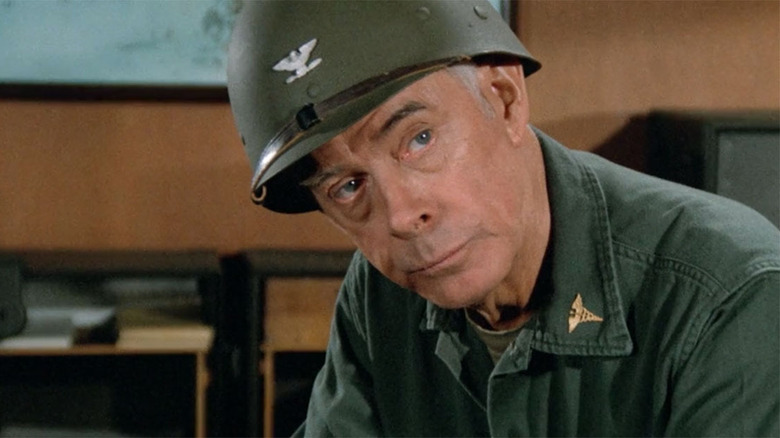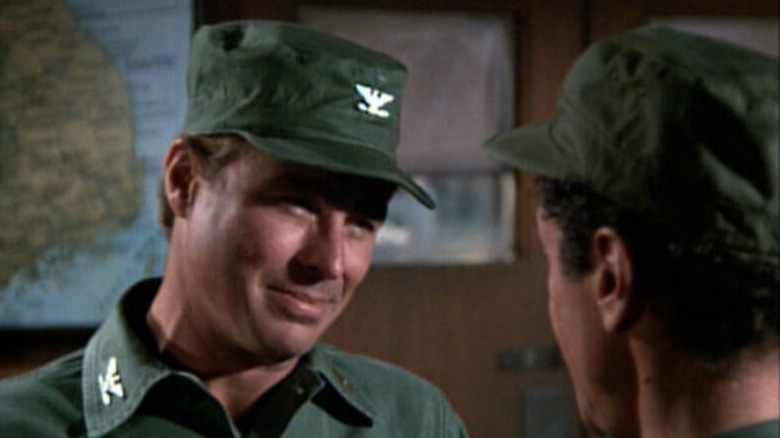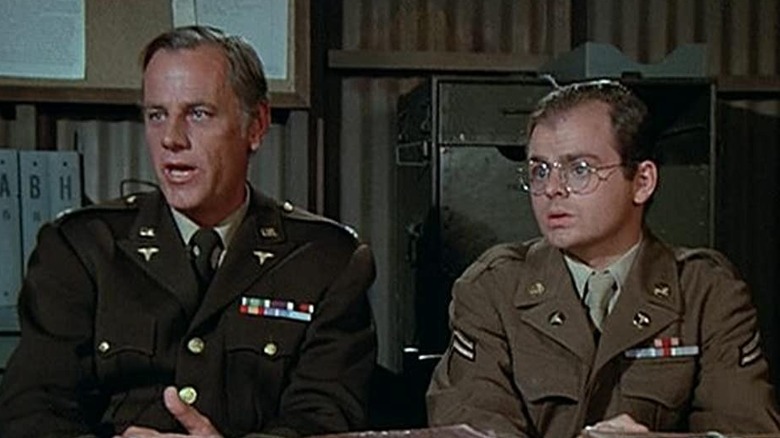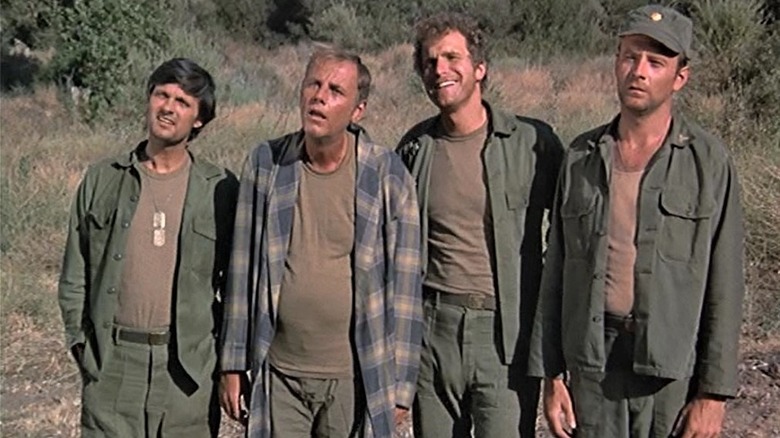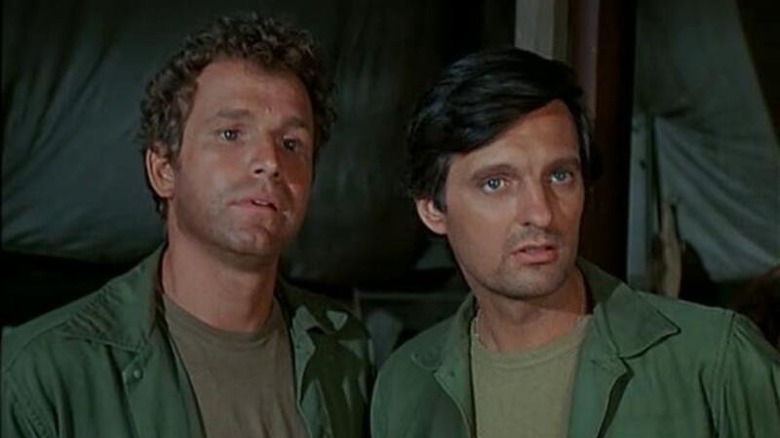MASH Storylines That Disappeared Without Explanation
One of the longest-running and most celebrated sitcoms of all time is "M*A*S*H," the CBS adaptation of Richard Hooker's 1968 semi-autobiographical novel and the popular 1970 feature film version. Set during the Korean War, "M*A*S*H" follows a U.S. Army mobile surgical hospital that experiences a seemingly never-ending flow of patients, passing the time with wacky antics and defying military brass whenever possible. At the head of the ensemble cast is Captain Benjamin Franklin "Hawkeye" Pierce (Alan Alda), the chief surgeon whose skill in the operating room is only outweighed by his unshakeable contempt for war and his military overseers.
Running for 11 seasons and populated by an ever-cycling principal cast, "M*A*S*H" has plenty of storylines that either never see a proper resolution or are quietly dropped and forgotten. From characters abruptly leaving the series to crucial developments that never see a substantial impact beyond single episodes, the show leaves some conspicuous plot threads dangling by the time the final credits roll. Here are the biggest "M*A*S*H" storylines that disappeared without explanation.
Hawkeye's disappearing Korean assistant
One of the plot threads from Richard Hooker's "M*A*S*H" novel and the 1970 film adaptation that's carried over into Season 1 of the television series is the inclusion of Hawkeye's Korean personal assistant Ho-Jon (Patrick Adiarte). Ho-Jon helps Hawkeye and "Trapper" John McIntyre (Wayne Rogers) around the camp, appearing repeatedly throughout Season 1 and even being accepted into Hawkeye's old college in America in the series premiere. However, Ho-Jon stops appearing on the show after the end of Season 1, with no mention made of whether or not he actually travels stateside to pursue a career in medicine.
In both the novel and film, Ho-Jon is drafted into the South Korean army, with the novel having him be wounded and continuing to help Hawkeye and Trapper around the camp after recovering. In the show, Ho-Jon is never drafted into the military, and his final appearance takes place in the late Season 1 episode "Ceasefire" when the camp celebrates false news of the end of the war. After making seven appearances throughout Season 1, Ho-Jon is quietly dropped from the "M*A*S*H" supporting cast. After having such a prominent role in the premiere and throughout the season, it's odd that he's never heard from or even mentioned again.
Frank Burns gets a big promotion
The biggest recurring antagonist Hawkeye and the rest of the 4077th ever have in "M*A*S*H" is Major Frank Burns (Larry Linville), an incompetent combat surgeon who contantly flaunts his rank and vies to control the camp. Ultimately, it isn't the other surgeons' antics, his mounting frustration at not becoming a commanding officer, or the general pressures of war that make Frank snap. Rather, it's his extramarital lover Margaret Houlihan (Loretta Swit) marrying another man that pushes him over the edge. After Margaret marries Donald Penobscott (Beeson Carroll) in the Season 5 finale, Frank goes AWOL in the Season 6 premiere and is eventually deemed mentally unfit to continue to serve in the 4077th.
This disastrous turn ultimately benefits Frank's career ambitions, as learned by Hawkeye during a phone call with his old nemesis. As it turns out, Frank gets promoted to the command of a military hospital back in the States. After leaving the 4077th, he never surfaces again — not even after Margaret gets divorced. After being such a memorable antagonist to Hawkeye and the camp for so long, Frank is quickly and quietly brushed aside. The show moves on, quickly replacing him with the far less villainous Charles Emerson Winchester III (David Ogden Stiers) and making no further mention of how Frank fares in his new role.
Klinger stops dressing up for an early release
One of the longest-running gags in "M*A*S*H" is Corporal Maxwell Q. Klinger's (Jamie Farr) constant attempts to earn a Section 8 discharge — a ruling that he was mentally unfit for service — in order to get a ticket home. To accomplish this, Klinger consistently wears women's clothing and outlandish outfits while on duty instead of his usual uniform, still operating as usual despite his choice of outerwear. Early on in "M*A*S*H" Season 8, Klinger drops this longstanding ploy for a release and starts wearing his regular fatigues again, though he still gets up to kooky antics pretty frequently.
Klinger makes this visible change after being promoted to sergeant and becoming the camp's new company clerk, replacing Radar O'Reilly (Walter Burghoff) after he leaves. Outside of this promotion, though, there's no real reason given for Klinger dropping his dedicated efforts to leave the military. He'd always done his duty before, and he repeatedly expresses a genuine love of the flamboyant clothes he wears, so it's odd that a change in responsibility would cause him to reverse course so intensely. In an interview with the Smithsonian Institute, Farr claimed that the producers felt Klinger's fashionista joke had run its course, leading it to be quietly retired for good and the character being given other material to work with.
Margaret's tumultuous love life
When "M*A*S*H" begins, Margaret Houlihan has already developed a reputation for being a heartbreaker among senior Army brass, ultimately shacking up with Frank Burns while they're both stationed at the 4077th. This liaison abruptly ends when Margaret impulsively marries a lieutenant colonel named Donald Penobscott, though this marriage ends up being short-lived. Things deteriorate after Margaret discovers that Donald is having an affair, and they divorce after he's transferred far away to San Francisco. As Margaret's marriage steadily deteriorates, she embarks on a surprising romance with Hawkeye, despite the years of shared animosity between them when she was involved with Frank.
While Hawkeye and Margaret are lost together in enemy territory in the two-part Season 6 episode "Comrades in Arms," they end up finding romantic solace with one another while taking cover. However, this shocking development doesn't persist beyond the two-part episode, save for a passionate kiss the two share before parting ways in the series finale five seasons later. Margaret's post-divorce romantic life is never addressed outside of her brief dalliance with Hawkeye, though her separation from Donald does give her a heightened sense of self-respect and confidence as she becomes her own woman without the need for a love interest.
Charles Winchester's deep obsession with death
Major Charles Emerson Winchester III – a combat surgeon from an affluent Boston family who's drafted into the military — replaces Frank Burns in the cast of "M*A*S*H" in Season 6. Far more intelligent and humane than Burns ever is, Winchester experiences a tumultuous character arc during his time stationed with the 4077th as he sees the horrors of war firsthand. One of the most remarkable moments in Charles' wartime journey is a close brush with death in the Season 9 finale, which deeply affects him and his outlook on mortality. However, this development is confined only to the one episode.
While attending to incoming patients outside, a nearby sniper shoots at Charles. The bullet passes through his cap mere centimeters away from killing him instantly. The incident visibly affects Charles, who becomes obsessed with death. He even travels to the frontline to help the wounded and ask the dying what they're experiencing before they pass. This macabre obsession is never touched on again after Season 9, with Winchester no longer as fixated on mortality and seemingly moving on. The matter is never revisited.
Hawkeye's long-lost common law wife
Right from the "M*A*S*H" series premiere, Hawkeye presents himself as an avowed bachelor and a shameless womanizer, embarking on plenty of casual relationships over the course of the show. In the Season 4 episode "The More I See You," however, Hawkeye is reunited with the one who got away, Carlye Breslin (Blythe Danner) — an Army nurse stationed in Korea. Over the course of the episode, it's revealed that Hawkeye and Carlye lived together in a common law marriage before their relationship crumbled due to Hawkeye choosing to focus on his career.
Though Carlye has since married another man, she and Hawkeye start to rekindle their romance before she decides to transfer to a different post, separating them once again. Hawkeye quietly admits to B.J. Hunnicutt (Mike Farrell) that he'll always carry Carlye with him, but their relationship is never mentioned again. This rare glimpse into Hawkeye's personal life before he was drafted is closed firmly, with no more references made about him having a common law wife for the rest of the show.
BJ's strained family life
In comparison to Trapper, Frank, and Henry Blake (McLean Stevenson), B.J. Hunnicutt is a stoically faithful husband while stationed in Korea, deeply missing his wife and daughter ever from the moment he's drafted. Despite this distinction, B.J. nearly cheats on his wife on two separate occasions during the series, each of which leaves him incredibly remorseful about nearly committing infidelity. These incidents, coupled with a heartbreaking mix-up when a homecoming Radar is mistaken by B.J.'s daughter as her father, leave B.J. wondering how he will be received back home.
In moments of mutual attraction and loneliness, B.J. considers cheating on his wife in the Season 5 episode "Hanky Panky" and the Season 8 episode "War Co-Respondent." He's even more shaken up realizing how much of his daughter's life he's missed, leading to him punching Hawkeye when his friend tries to talk some sense into him. B.J. leaves the camp more confident about his home life after slugging his best friend, with his fears never as directly articulated again and his final fate left undisclosed in the sequel series "AfterMASH." It appears that the secret to resolving marital strife is simply punching Hawkeye Pierce.
Trapper John's severe medical condition
Like many of those serving with the 4077th, Trapper John McIntyre frequently vies for a way to get back to his family as soon as possible. Though his wish is ultimately fulfilled at the start of Season 4, he was nearly sent home much sooner in the Season 3 episode "Check-Up." While undergoing a medical examination, Trapper discovers he's developed painful ulcers from the prolonged wartime stress, with the condition potentially providing him an early ticket home.
As the rest of the camp prepares to throw a going-away party for Trapper, he receives news that the U.S. Army no longer offers an honorable discharge for ulcers. While Trapper is offered the chance for a reassignment to treat his condition properly, he declines in order to continue serving with the 4077th. Trapper presumably recovers from his painful ailment, but his health issues are never mentioned again for the remainder of his time on the show, despite the ever-present stress he endures.
Colonel Potter's growing self-doubt
Colonel Sherman Potter (Harry Morgan) is part of a dying breed in the military during "M*A*S*H" — one of the few to have served in both World Wars before continuing his service in Korea. Though Potter proves to be an effective commander for the 4077th — in many ways more competent than Henry Blake before him — he begins to feel his age as he serves in his third conflict zone. This self-doubt is brought up explicitly in the series' penultimate season, but it isn't broached again for the remainder of the show or in "AfetrMASH."
In the Season 10 episode "Pressure Points," Potter begins to make several concerning mistakes in the operating room, leading others and himself to question his effectiveness. This affects Potter so deeply that he summons Army psychiatrist Sidney Freedman (Allan Arbus) to evaluate him before deciding to forego his retirement for the remainder of the war. Suddenly, Potter's competency and confidence are magically restored. Not only does he table discussions about his retirement, but he continues working throughout "AfterMASH," heading a veterans' hospital stateside.
Colonel Flagg and Sidney Freedman's feud
The 4077th entertains several recurring Army personnel as guests across the show's run, with two of the most notable being Sidney Freedman and Colonel Sam Flagg (Edward Winter). Whereas Sidney is an effective and compassionate psychiatrist who provides vital mental health support, Flagg is a jingoistic buffoon from military intelligence who's ready to bust any suspected subversive types within the Army's ranks. The two officers clash when they cross paths in the Season 4 episode "Quo Vadis, Captain Chandler," but this grudge is quietly brushed aside afterward.
After the 4077th treats Arnold Chandler (Alan Fudge), who believes himself to be Jesus Christ, Sidney arrives to assess the man's mental health. At the same time, Flagg is summoned to return the man to active duty as soon as possible. Immediately bristling at Sidney's attempts to approach Chandler with compassion and empathy, Flagg accuses the psychiatrist of abetting the wounded pilot's delusions and labels him a communist. Though Flagg threatens to have an unfazed Sidney punished for not signing a loyalty oath with the Army, nothing becomes of this vendetta, and the matter is never discussed again.
Frank and Margaret's attempted camp takeover
Frank Burns is always transparently jealous of whoever holds the commanding officer position at the 4077th, believing himself to be the most qualified person stationed at the camp for the role. Frank and Margaret constantly scheme for ways to subvert Henry Blake's authority, often going behind his back to further their career ambitions and their vendetta against Hawkeye and Trapper. In the Season 2 episode "The Trial of Henry Blake," Frank and Margaret make their most brazen move ever by attempting to court-martial Henry.
Filing a litany of charges belittling Henry's fitness to command, Frank and Margaret also formally accuse the Colonel of treason for providing aid to the enemy. Though Henry's suspected aid is revealed to be helping Korean orphans, Frank and Margaret remain adamant in their stance. That is, until Hawkeye privately threatens Frank with exposing the accusers' extramarital affair to Frank's wife. Despite the gravity of what Frank and Margaret allege against Henry with Army brass, and their own underhanded tactics that could result in formal disciplinary action, Frank and Margaret suffer no visible consequences.
The 4077th's black market connection
With the Korean War raging around them and no apparent end in sight, the doctors of the 4077th sometimes have to resort to desperate measures to get the life-saving supplies they need to get the job done. In the series' second episode, "To Market, to Market," this entails Hawkeye and Trapper getting in deep with the local black market to get medical supplies. Despite falling in with some shady figures, however, the 4077th is evidently free of its illicit ties later in the show, with no visible strings attached to the camp's deal with the figurative devil.
After learning that the camp's entire supply of hydrocortisone has been stolen by black marketeers, Hawkeye and Trapper arrange for its return in exchange for Henry's antique wooden desk –- without his knowledge, of course. The deal goes through without a hitch, much to Henry's obvious chagrin, as his desk is airlifted directly out of the camp by helicopter. Despite being targeted by the black market so early in the series, the 4077th never has to contend with such shady types directly again.
Hawkeye and Trapper's non-farewell
One "M*A*S*H" departure that conspicuously lacks any on-screen farewells is that of Trapper John, who's described as being rushed back home stateside in the Season 4 premiere. Hawkeye races to the airport to bid his best friend one last goodbye but arrives too late and meets his recently arrived replacement B.J. instead. The swiftness with which Trapper leaves Hawkeye behind, without making any effort to reach out to his friend after the fact, is one of the series' more puzzling moments.
As much as Trapper loathes serving in the military and being separated from his family, he cares more for his friends in the 4077th than he lets on, going as far as to turn down reassignment in Season 3. The idea that Trapper would never contact Hawkeye after returning home, and the fact that he's barely referenced thereafter, is unsatisfying to say the least. Though Hawkeye seemingly overcomes being abandoned by his best friend in short order, he makes a rare reference to Trapper's exit in the series finale, fearing B.J. will do something similar to him. The implication seems to be that he and Trapper never spoke to each other again but why exactly remains one of the biggest unanswered questions in "M*A*S*H" to this day.
